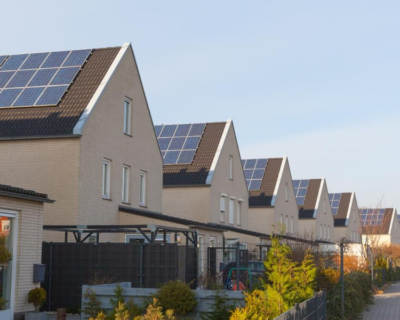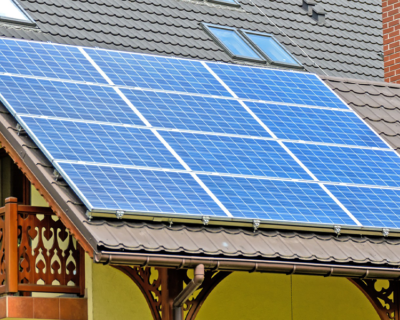Why Solar Power
Willing to switch to solar power to generate free and eco-friendly electricity? We have streamlined the process of finding the right solar vendor for you. Get quotations from DISCOM-empanelled vendors with a detailed breakdown of pricing.
- Home
- Why Solar Power
Reasons Why Everyone Should Use Solar Power
Solar power is the absorption of solar radiation from the direct rays of the sun and its further conversion into electrical energy using advanced technologies. With the invention of solar technologies, it is now possible to capture electromagnetic radiation and turn it into usable energy consumed by regular appliances.
To give you a better understanding of the concept of solar power, we have come up with a detailed guide on the applications and reasons specifying why we should use solar energy.
How Can We Use Solar Power?
Playing a vital role in our fight against global warming, solar power has several applications with each offering a number of advantages to the communities that it serves. With its easy applications and harmless environmental impacts, it is no wonder why we should use solar energy.
Let’s stay up to date with the most common applications of solar power that you can observe lately in the world.
Solar Power for Electricity Generation
Solar power is an inexhaustible and renewable source of energy used for generating electricity and running up electrical appliances for daily purposes. With the help of solar technologies such as photovoltaic panels and PV rooftop systems, the absorption of sunlight and its further conversion into electrical power is possible.
Solar Power for Cooking
You can also use solar power as a source of thermal energy and further consume this energy for cooking purposes. A solar cooker, also known as a solar oven, is a cost-effective alternative of traditional cookers, helping you save a substantial expenditure spent on electricity. Moreover, the mechanism of solar cookers has no dependence on any fuel-based elements such as coal or gas making it a sustainable option of cooking.
Solar Power for Industrial Use
Apart from residential purposes, we can implement solar power solutions for producing electricity in industrial projects with large-scale consumption. With solar power, industries can generate electricity at higher levels and drive up heavy machinery/equipment. Unlike fuel-based electricity, the electrical energy harnessed from solar radiation does not lead to corrosive reactions and reduces monthly utility bills.
Solar Power for Battery Charging
Solar power can be used for charging batteries and other electronic power-run devices such as mobiles and laptops. A solar power system can store the excess energy in its battery backup component after absorbing solar radiation and provide electricity for future use. Moreover, some portable chargers use solar power to fuel electricity-based devices when there is limited supply.
Solar Power for Heating Purposes
Another thermal application of solar power generation is a solar hot water system. A solar hot water system uses the thermal energy generated out of solar radiation for heating water or the air temperature in a building structure.
Solar Power Use in Generators
A solar-powered generator is an ensemble of portable PV modules, a battery backup, an inverter and a battery charger. This advanced device absorbs solar radiation and stores it for generating and distributing electricity where installation of solar power systems is not feasible. Such devices operate using solar power and their use is commonly prevalent in camping and boating trips.
Solar Power for Ventilation
Just like how we can use solar power for heating the air temperature in a room, a solar attic fan can use solar radiation for cooling purposes. It also reduces the burden on a HVAC and its electricity consumption which in turn, leads to reduced utility bills.
Solar Power for Pumping
A solar heater relies on a pumping system for circulating water through all of its components. A conventional pumping system generally installed at our homes functions by consuming the energy supplied through the grid. However, we can switch to solar-powered pumps which can circulate water and maintain its pressure throughout the entire system for 24 hours.
Solar Power Use in Security Cameras
In general, regular security cameras use data cables for wiring and function with the help of a battery. To maintain the efficiency of these devices, the battery used in a security camera needs frequent recharging every few months. The installation of solar-powered security cameras avoids such hassle of recharging with utmost efficiency. Primarily dependent on solar radiation for a charge, these cameras use WiFi for continuous recording of video footage, unlike other cameras that record when they detect motion.
Other Uses of Solar Power
The energy generated from a solar power system can be used in multiple different ways other than the above-mentioned applications. Solar power can provide uninterrupted lightning in rural areas where electricity production is limited or scarce. Additionally, there are also several pocket calculators designed in India that use solar power for their operations.
Why Should We Use Solar Power?
More than 40 countries around the world are utilizing solar power today. Among them, India is one of the major countries being the top installers of solar power systems in the world.
Let’s understand why all these countries are encouraging the adoption of solar power. Here are some important reasons why we should use solar energy in our day-to-day lives.
Clean and Environment-friendly Energy
It is a most commonly known fact that solar power is an eco-friendlier and cleaner source of energy than fuel-based energy generation by grid utilities. The traditional ways of generating electricity depend upon the extraction of harmful greenhouse gasses such as fossil fuel and coal, leading to carbon emissions in the environment. These carbon emissions are primarily responsible for the increasing global concern of climate change and pollution. A self-sufficient source of energy generation, the use of solar power does not involve any release of greenhouse gasses and thus reduces the carbon footprint.
Grid Independent Source
The production of grid-based electricity involves securing a consistent supply of fossil fuels for the extraction process. However, these fuels and other natural gases are limited resources with skyrocketing costs which makes the consumption of generated electricity expensive. On the other hand, solar power is a renewable energy, enabling project developers to save themselves from the volatile prices of grid-based electricity. Solar power also offers control over the generation and supply of electricity in times of blackouts.
Utilization of Available Rooftop Area
The available rooftop area in most of the building structures in India is underutilized. The use of solar power ensures optimum utilization of this available space for a better cause. With solar panels mounted on rooftops, you can take advantage of this underutilized area for generating electricity as per energy requirements.
Lesser Energy Waste
Generally, the process of supplying electricity from the grid utility to the end-consumers involves the transmission of electrical power through extensive networks. This transfer of power from the grid sometimes results in energy waste with longer distances involved. However, the process of electricity generation through solar power ensures a complete transfer of energy with zero wastes and interruptions considering the close proximity of a system from a site. Thus, a solar power system is a reliable source, contributing with utmost efficiency and ensuring reduced waste.
Freedom from Recurring Costs
No one across the globe can exercise their monopoly on the use of sunlight and its solar energy. It is quite obvious to conclude why the source of solar power and its application, to some extent, is considered free. While the installation of solar technologies involves huge investment up front, their application provides beneficial profits in the longer run. Considering the reduced dependency on grid-based electricity, solar power has the potential of offering cost-savings with no recurring expenditure.
Clean and Environment-friendly Energy
It is a most commonly known fact that solar power is an eco-friendlier and cleaner source of energy than fuel-based energy generation by grid utilities. The traditional ways of generating electricity depend upon the extraction of harmful greenhouse gasses such as fossil fuel and coal, leading to carbon emissions in the environment. These carbon emissions are primarily responsible for the increasing global concern of climate change and pollution. A self-sufficient source of energy generation, the use of solar power does not involve any release of greenhouse gasses and thus reduces the carbon footprint.
Low Maintenance
One of the reasons why we should use solar energy is the low maintenance nature of the devices using such energy. Advanced technologies using solar power mostly require lesser maintenance as compared to other modes of electricity generation. In a solar power system, the PV panels require minimal cleaning twice every year whereas the maintenance cost of inverters generally incurs in every 5-10 years.
Reduced Electricity Bills
With reduced dependency on grid-based electricity, the application of solar power can result in a significant reduction in the amount of energy consumed and purchased from the grid. Its use can be an affordable approach towards meeting daily energy requirements in the longer run. Some installations of solar power plants come with a net metering mechanism, recording the excess energy sent back to the grid. As per this record, utility grid companies can issue credits to consumers in a way, by adjusting it against their monthly bill.
Increased Real Estate Value
With solar power technologies being in great demand in India, a solar-installed property has an increased market value. As per a report, a solar-installed property sells 20 percent faster than an ordinary property using grid-based electricity. The installation of such technologies is an upgrade and offers more real estate value to its owner during the sale. Hopefully, now you are fully aware of the revolutionizing trend of using solar power in the world. We, at Das Energie Private Limited, understand that adopting such solar power solutions involves a huge investment. But fret not, since we provide a wide range of services ensuring that our solar power system suits your energy requirements and functions at maximum efficiency. Choose Das Energie Private Limitedto optimize your installed technology’s performance and maximize the return on your investment.
Frequently Asked Questions
A solar power system can function even at times when the sun is not out. For instance, on cloudy days or at night, a solar power system can generate electricity by using the stored power in the battery backup component.
Yes, project developers can choose to go off-grid with solar power. There are several off-grid solar power systems available in India that function entirely without having any connection to the grid, by using extensive battery and storage components. However, the installation cost of such systems is comparatively more than grid-connected solar power systems.
Yes, the Government of India provides several subsidies and incentives for adopting solar-powered solutions and installing solar technologies. These subsidies aim to provide financial assistance to all project developers by reducing the initial installation cost. Apart from the subsidies, the Central Government also provides tax exemptions for the first few years after installation and offers generation-based incentives for producing electricity.
A south-facing rooftop area is generally an ideal place for installing solar-powered panels. A solar panel is the main component of a solar power system which absorbs solar radiation for generating electricity. Thus, the placement of solar panels should be directly towards the sun without any obstructions.
Mostly, all solar power systems are engineered to have a life expectancy of 25 to 30 years. However, one can maximize the life expectancy of a solar power system through timely and regular maintenance.
The cost of a solar power system depends upon the type of its installation and the energy requirements of a project developer. However, the average cost of a solar power system with a capacity of 1 kW ranges between ₹65,000 to ₹1,05,000 in India. With such capacity, a solar power system can generate up to 5 units of electricity every day and 1500 units annually.
The rooftop area required for installing a solar power system is calculated on the basis of the energy capacity of such a system. For instance, a solar power system with a capacity of 1 kW requires an obstruction-free space of 100 square feet.
Yes, a solar power system can produce sufficient electricity to run an air conditioner. To run an air conditioner of 1 tonne, a solar power system consisting of 10 PV panels, each with a capacity of 250 watts, is required in general.




